By Tom Cardamone, July 2, 2015
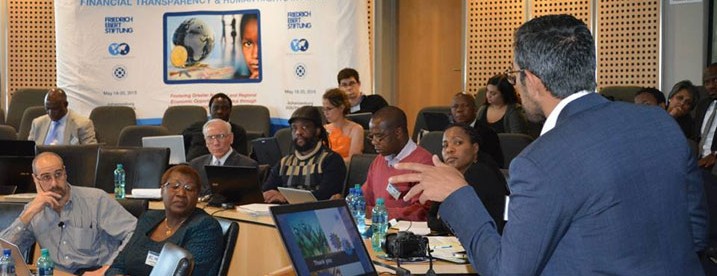
A Quarterly Newsletter on the Work of Global Financial Integrity from April to June 2015
Global Financial Integrity is pleased to present
GFI Engages, a quarterly newsletter created to highlight events at GFI and in the world of illicit financial flows. We look forward to keeping you updated on our research, advocacy, high level engagement, and media presence. The following items represent just a fraction of what GFI has been up to since March, so make sure to check our
website for frequent updates.
Joint Conference in Johannesburg: Financial Transparency and Human Rights in Africa
The Friedrich-Ebert-Stiftung (FES), Global Financial Integrity (GFI), and the International Bar Association’s Human Rights Institute (IBAHRI) partnered to host a three-day conference in Johannesburg, South Africa fromMay 18-20. The conference featured special expert-level discussion on the connection between human rights and illicit financial flows in Africa and the legal, advocacy, and academic channels for leveraging these connections to effect change.
Panelists and keynote speakers were drawn from around Sub-Saharan Africa and across the globe, covering a broad range of topics within the financial transparency-human rights overlap, including natural resources, violent conflicts, long-term development consequences, and the ongoing Sustainable Development Goal (SDG) process.
By Sophie Haggerty, June 15, 2015

Other Countries Should Follow Norway’s Example
On June 5, the Norwegian Parliament unanimously voted to establish a public registry of corporate ownership information, becoming the latest country to tackle the abuse of anonymous companies through increased transparency.
Anonymous companies are one of the top tools used by criminals, kleptocrats, tax evaders, and terrorists to launder dirty money with impunity. Requiring companies to publicly disclose in a central registry their ultimate, human, beneficial owner(s) is regarded as the gold standard in tackling the abuse of these phantom firms.
Norway’s strong endorsement of transparency comes as no big surprise: the Scandinavian country routinely ranks near the top of transparency and anti-corruption rankings, and Norway was the first country to get behind the push to curb illicit financial flows. Their support on this topic dates back to the formation of the Norwegian Government-led Task Force on the Development Impact of Illicit Financial Flows in 2007 and their financial backing of the Financial Transparency Coalition at its inception in early 2009–long before illicit flows topped the global agenda.
In establishing a public registry, Norway joins Denmark and the United Kingdom—the first country to commit to a public registry of beneficial ownership information back in October 2013. The UK followed through with its commitment this March by passing historic legislation needed to fulfill its pledge.
By Heather Lowe, June 2, 2015
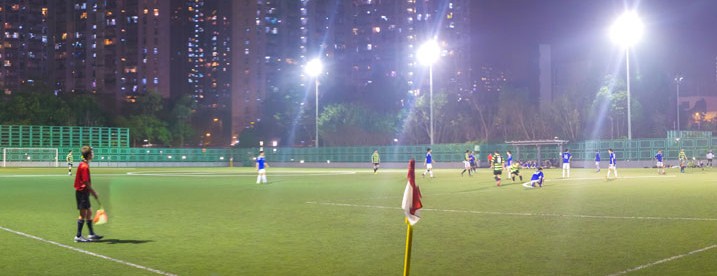
GFI’s Heather Lowe Proposes Reinvesting FIFA Forfeiture Funds in Inner-City Youth Soccer Programs
Following from my blogs on Friday and Monday about different aspects of the FIFA case, I’d like to talk a little bit about the forfeiture funds and penalty payments that the U.S. Department of Justice (DOJ) will be collecting in this case and what will happen to them. A proceeding like the FIFA case can result in a really large pile of cash that will be under DOJ control. Unless the Defendants are acquitted of the charges against them at trial or the DOJ decides to drop the case against a Defendant for some reason, we can expect that the DOJ will be collecting from those Defendants the bribe money that they received, anything they bought with that money that will then be auctioned off (for example, check out the list of real estate that will likely go under the hammer in Florida and Georgia from paragraph 343 of the indictment), and, possibly, additional fines in the form of penalties. It is going to add up.
Recouping Expenses
It is obviously critical that the DOJ, Federal Bureau of Investigation (FBI), Internal Revenue Service (IRS) and other government agencies that were involved in this case are able to recoup the money they spent working on this investigation over the past few years. Another way of looking at it is that they need to keep a sizable chunk in order to ensure that they have the resources to work cases like this over the next few years. No matter how you slice it, that’s important to American taxpayers as well, who pay less in taxes because the DOJ and other agencies are able to fund part of their work through forfeiture and penalty payments instead of through tax dollars. Win-Win.
By Heather Lowe, June 1, 2015

The FIFA Bribery Case Could Lead to Compensation for the Victims of FIFA’s Alleged Corruption
You may have noticed that the U.S. Department of Justice (DOJ) is making sure that we have an idea of whom the victims in this FIFA corruption case are. They noted it in their press release, talked about it at their press conference, and included it in the indictment at paragraph 73. I agree with the Department of Justice that the victims of this case are important. This blog is about why this case could potentially lead to compensation for those victims in a way you might not have considered.
So who are those victims? The DOJ’s indictment describes how FIFA, the FIFA confederations, the confederation members (including national member associations), youth leagues, and development programs all lost out on funds from the marketing contracts that may have been more lucrative for FIFA if there had been competitive bidding for the contracts. In addition, other sports marketing companies that may have lost out on a bid to secure the marketing rights—or may never even had a chance to bid—are also victims.
For those of us that work on development issues, this is a particularly important point. Commercial bribery distorts markets. Among other things, it can:
- prevent honest firms from winning bids and therefore stymie their growth,
- block new companies from entering a market, and
- weaken that market in general because the best service, price, processes, etc., are no longer going to rise to the top, keeping market standards low and depriving consumers of better quality services and products.
When a country or industry is plagued by endemic bribery, these negative economic effects increase exponentially and a country’s economy cannot grow. That’s why the DOJ doesn’t want large-scale bribery taking root in the U.S., and rightly so.
By Heather Lowe, May 29, 2015

This was a very exciting week for lawyers who are sports enthusiasts – the Department of Justice indicted fourteen FIFA officials, alleging that they are part of what one could conclude from reading the indictment is a massive, multifaceted, bribery ring. Informal allegations have been made before, and the whispers that FIFA is synonymous with bribery and corruption have been growing louder over the years. But this week the Department of Justice shouted it from the mountain top (or, perhaps more accurately, in front of a lot of the international press corps, which was probably more effective).
There are a number of interesting facets to the case that is now before us. The first is that for a case about bribery, a charge of bribery seems to be conspicuously absent. The Defendants were indicted for a “pattern of racketeering activity,” including charges of violating the Travel Act in aid of racketeering, money laundering, money laundering conspiracy, wire fraud, wire fraud conspiracy, and other charges that do not expressly include bribery. Why is that?
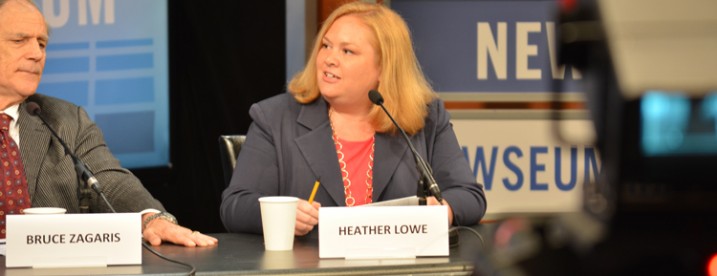
GFI’s Heather Lowe appeared on a panel at the Newseum on May 26, 2015, discussing the impact of the LuxLeaks and SwissLeaks investigations by the International Consortium of Investigative Journalists (ICIJ). The panel was sponsored by the Washington Foreign Law Society.
By Tom Cardamone, April 23, 2015
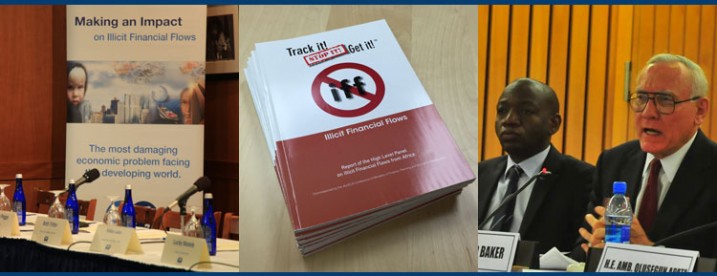
A Quarterly Newsletter on the Work of Global Financial Integrity from January through mid-April 2015
Global Financial Integrity is pleased to present GFI Engages, a quarterly newsletter created to highlight events at GFI and in the world of illicit financial flows. We look forward to keeping you updated on our research, advocacy, high level engagement, and media presence.
The release of this quarter’s newsletter was delayed in order to include the high level roundtable GFI held on April 17. The following items represent just a fraction of what GFI has been up to since December, so make sure to check our website for frequent updates.
GFI’s High Level Roundtable: IFFs, FfD, and SDGs: Global Perspectives
Global Financial Integrity was pleased to host a high level roundtable on April 17 that focused on the relationship between illicit financial flows (IFFs), Financing for Development (FfD), and the Sustainable Development Goals (SDGs). Respected members of the public, private, academic, civil society, and multilateral sectors from around the world provided their perspectives on how to tackle IFFs, improve domestic resource mobilization, and strengthen the development of financial management.
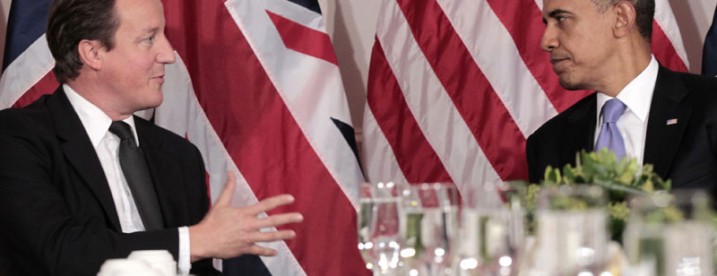
UK Enacts Legislation to Curb Abuse of Anonymous Companies—A Prime Money Laundering Vehicle—with Public Registry of Corporate Ownership Information
U.S. the 2nd-Easiest Place for Criminals to Open Anonymous Companies to Launder Dirty Money
WASHINGTON, DC – The United Kingdom today enacted legislation to crack down on the abuse of anonymous companies—a major conduit for laundering the proceeds of crime, corruption, and tax evasion—in a move that raises pressure on the United States to clean up its own house, noted Global Financial Integrity (GFI), a Washington, DC-based organization working to curtail illicit financial flows.








